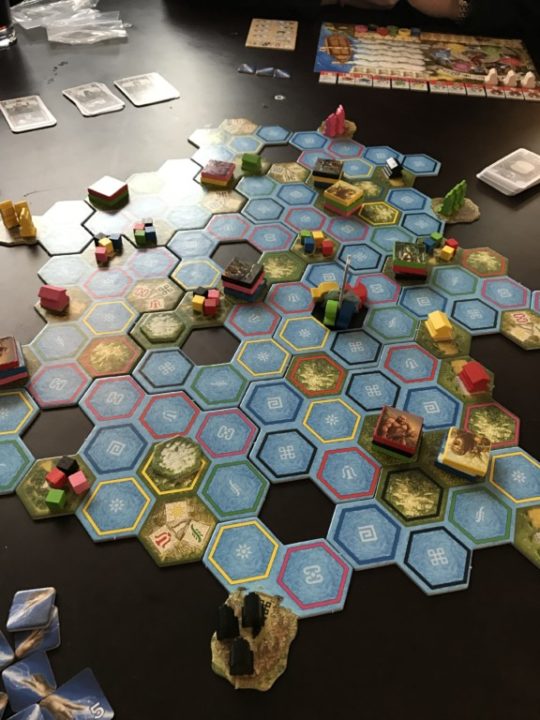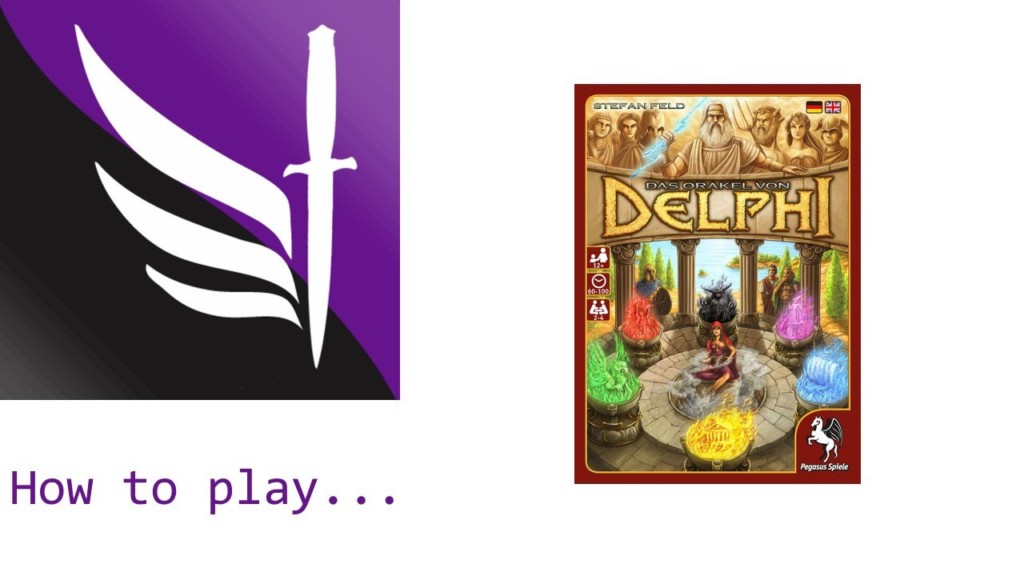The Oracle of Delphi is an action point allowance, pick up and deliver game.
Title: The Oracle of Delphi
Year Published: 2016
Designer: Stefan Feld
Publisher: Pegasus Spiele
Players: 2-4
Game Time: ~100 mins
Set-up Time: ~10 mins
Ages: 12+
Theme: Mythological Greece
Mechanisms: Dice Rolling, Action Point Allowance, Pick Up and Deliver.
How to win: Complete the 12 tasks and return to Zeus first.
Game Description
For once, Zeus, Greek god of thunder and sky, is in high spirits. Hence, he decides to offer a generous gift to a worthy mortal and invite him, or her, to his realm, to Olympus. To determine a sufficient candidate, Zeus hosts a competition for his entertainment. Twelve legendary tasks are imposed upon the fearless participants: to erect graceful statues, to raise awe-inspiring sanctuaries, to offer capacious offerings, and to slay the most fearsome monsters. The first participant to master all the posed assignments wins the favour of the father of the gods himself.
Indubitably, you will not pass up this golden opportunity, so you clear your ship and rally your crew to follow on the trails of legendary Odysseus through the dangerous waters of the Aegean. But how could you find the righteous path onward? There is but one who can help you. Visit the mysterious oracle of Delphi and let her answers guide your ways.
Set Up, Game Play & Game End
The Oracle of Delphi Round-Up
When you ‘race to a target’ in a board game I often feel there is an unsatisfactory ending as one player will clearly win and you can’t really do much about it.
I’m not talking about Race games like Automobiles, just games that race to a target like this one, or Splendor.
The reason I don’t like this is that it railroads you into being the most efficient player on the table. You don’t get to try something different and win as you can in games like Russian Railroads. (Funnily enough, Russian Railroads does not Railroad your strategy :))
Dice Mechanism
But after playing this I just couldn’t stop thinking about how good the dice mechanism was. It’s restrictive as you can’t always do everything you want but it’s flexible too. On a turn where you can’t use a die, you can use it to pick up some Favour tokens and make your NEXT turn more flexible.
The other issue is missing a turn which can be prevented.
Those spare dice you couldn’t use can (and maybe should) be used to remove wounds if possible and it also makes increasing your Shields more important than you think. With 0 shields you’ll get a wound EVERY round so you’ll miss a turn after 5 rounds if not before then at least every 3 rounds after that. That’s only if you don’t roll a ‘0’ when fighting a monster which will accelerate this process…
So, wound management and Sheilds are important.
Tasks
You have 12 tasks to complete in any order you choose and at the start of the game, if you want, you can create an optimum path around the board to do this.
Of course, your optimum path will be the same, or at least VERY similar to everyone else’s. The special abilities of the boats and the starting die roll etc change this but if the game starts with an offering near Zeus and its related Temple not too far away then well, first come first served.
The ‘Consult the Oracle’ phase works very well too. (Assuming everyone is paying attention.) All the other player is doing is rolling their dice in preparation for the next round but it involves all the other players. It also makes you want to move your Gods onto the track to keep them moving on.
All Together
That’s the best thing about this game, everything affects everything. Shields, Gods, Dice, Favour tokens, Companions etc all help. Completing a task not only puts you one step closer to winning the game but also provides a permanent ability to help you win or a little boost which at least helps you get to the next task a bit quicker…
So while I don’t like racing to the target style games, I like this acceleration of the player’s ability to complete tasks as they sail around the board trying to get to Olympus.
The Oracle of Delphi Rating
Despite one of the main parts of the game being something I dislike, I really REALLY like this game.
I give it 7/10
The Oracle of Delphi First Impressions November 2016
This is my favourite Feld game in gameplay only. I love the dice placement of Bora Bora and how nice Castles of Burgundy is, but this is my favourite for gameplay.

Problem is, it’s a ‘race to the finish’ game and I generally don’t like and I would prefer the standard Feld Points thing.
But it’s very smooth though and despite not having an ending I’d like, it’s a very good game.
Jesta ThaRogue



Leave a Reply